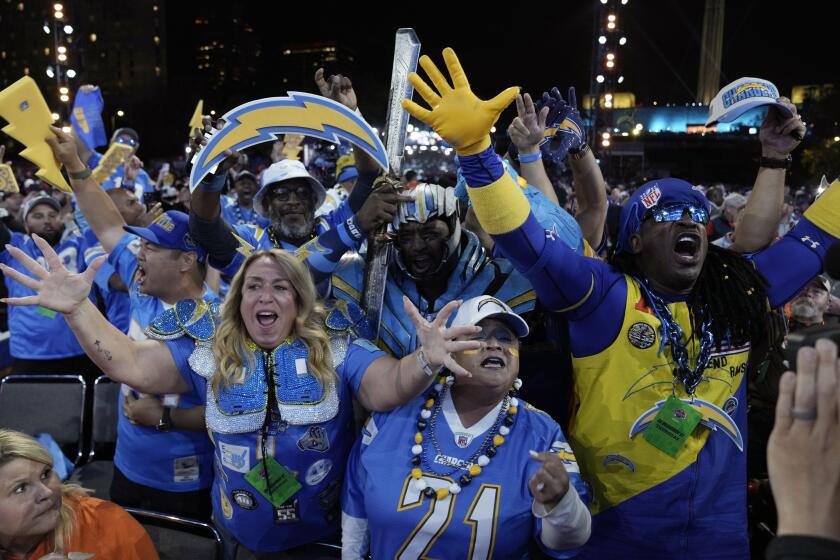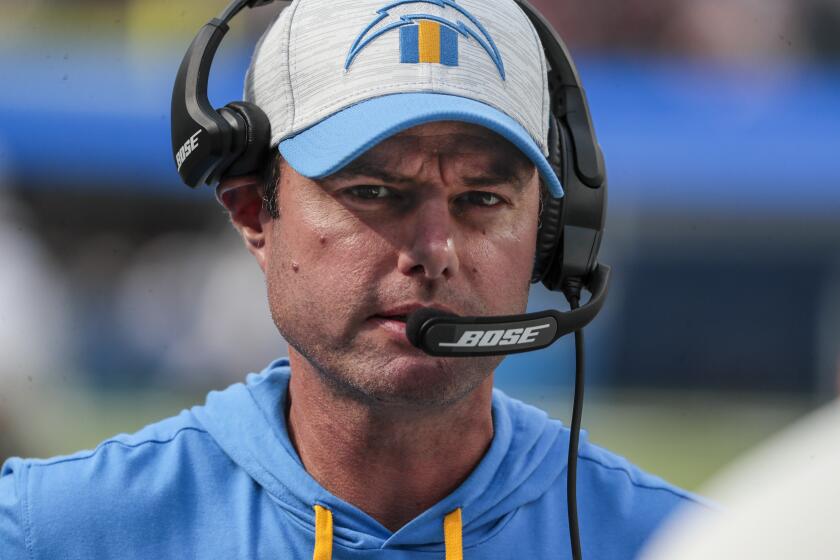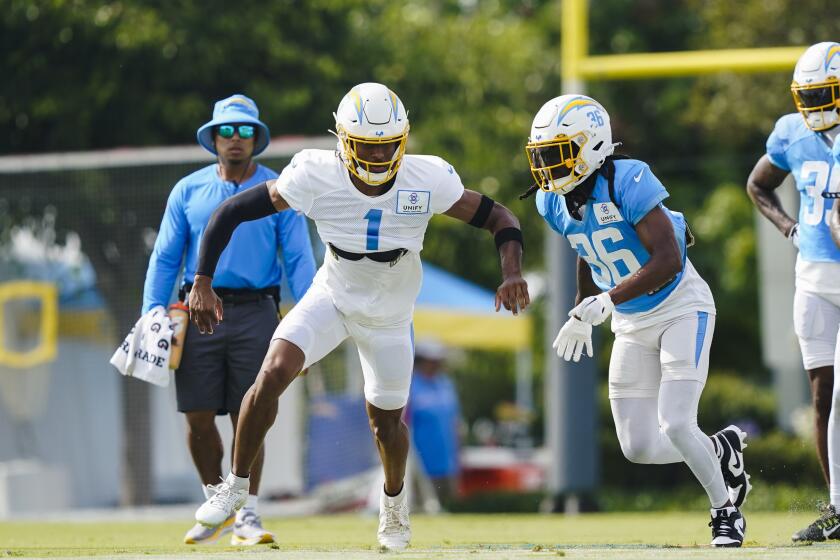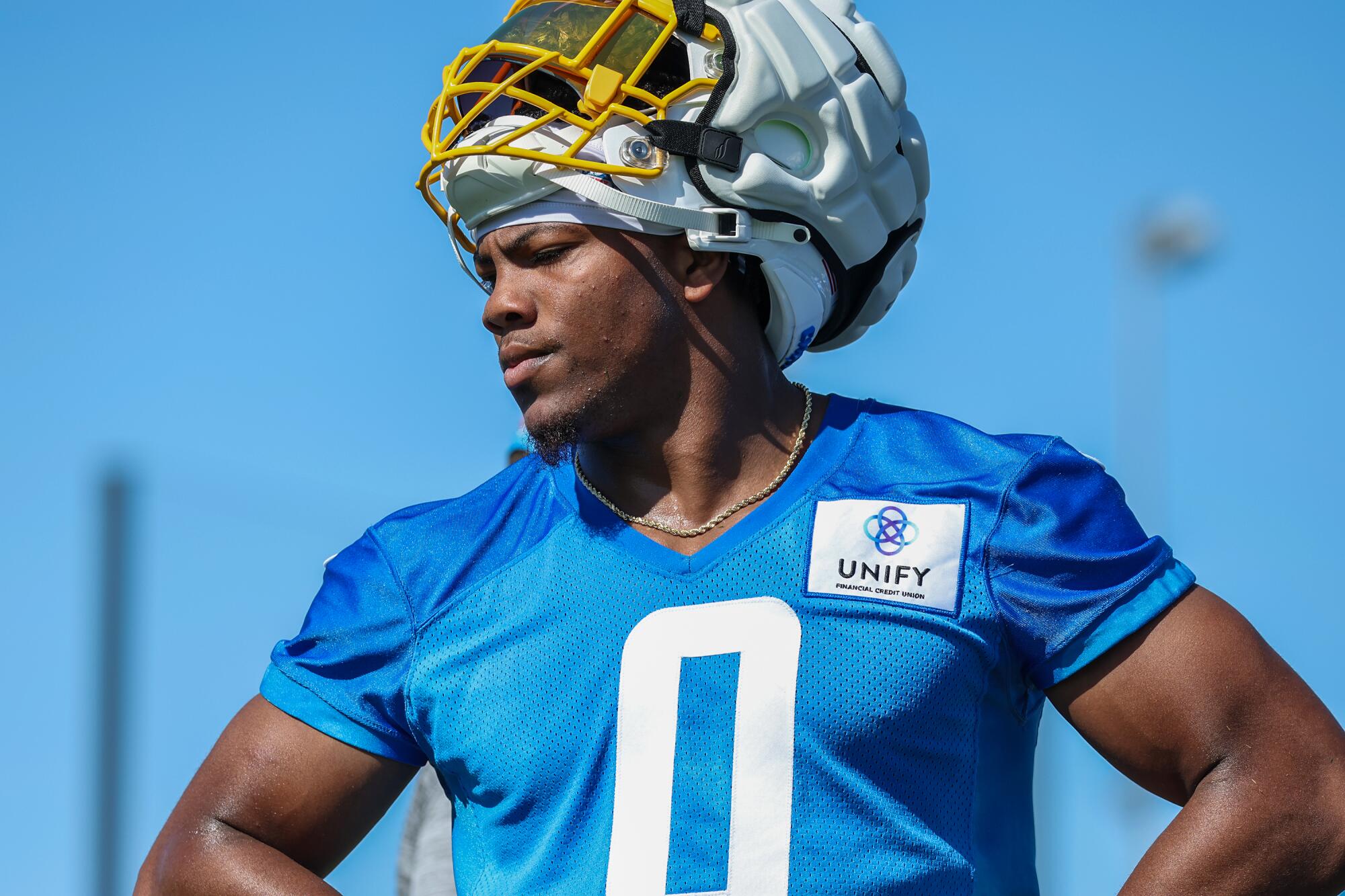
- Share via
What follows is a football story and a father-son story and a comeback story. Yeah, a comeback story, one for all time.
Most of all, though, this an L.A. story, a hometown tale that starts in a torrent of gang violence on the blocks of Crenshaw and ends in a cozy huddle of Chargers on the turf of SoFi Stadium.
That covers a distance of barely five miles. But this is L.A., where even the shortest commutes can unravel into an agonizing misadventure of dead ends, regrettable decisions and maddening detours.
Daiyan Henley, a Chargers third-round draft pick in April, was conceived in prison, the son of a first-generation Crip who served 13 years after being convicted of trying to rob an undercover sheriff’s deputy of 33 pounds of cocaine.
Eugene Henley reemerged changed and determined to raise his third son better than he did his first two, determined to help heal the community he had wounded, determined to build, to unite, to lead.
“It’s one heck of an origin story,” Daiyan said. “You know how they talk about antiheroes, the people who are the bad guys but they really aren’t? That’s my dad.”
Breaking down the Chargers’ 2023 NFL draft picks and how they might contribute on offense, defense and special teams next season.
He’s still known by most people as “Big U,” though the kids he mentors on the local football field call him “Coach U.” Eugene is a hulking, hollering 6 feet 5 with a reputation twice that towering, dating to a time when he became, as Wiz Khalifa once declared, rap music’s “godfather.”
Eugene also is a multi-cellphone-wielding, Range Rover-maneuvering entertainment executive who produces documentaries, managed Kurupt and launched the career of Nipsey Hussle.
But it’s in his youngest son that he has found his greatest achievement, this icon of the ’hood making his biggest moves at home.
“Daiyan’s my example to the world,” Eugene said. “I came out to save him and guide him. And I won, you know what I mean? I won.”
This is an L.A. story, all right, a stuffed and twisting script come to life right in the shadow of Hollywood.
Eugene met Stacey Allen when they were teenagers, at World on Wheels, the Mid-City skating rink that was part of Los Angeles’ early hip-hop scene and one of the places where Big U forged his image, often using his fists.
A student of martial arts with a temper that still teeters, Big U had an ability to separate another man from his wits and it became his signature. He wore long, cascading hair and sometimes giant, almost-goofy glasses — any suggestion that he might be square, however, disappeared when Big U started tossing his meaty, balled-up mitts.
In the 2021 documentary “Hip Hop Uncovered” — of which he was an executive producer — Eugene said: “Dudes knew that I was going to give a dude a head-up squabble and he wasn’t going to win. I wasn’t even going to mess the Jheri curl up.”
“Hip Hop Uncovered” details the lives of Eugene and four other players in the music business. The first five minutes introduce Eugene by one of his police mugshots.
Raised in Santa Monica, Stacey knew nothing of the volatile world this giant man was beginning to rule just 20 minutes down the 10 Freeway. The night they met, Eugene used a word unfamiliar to her, so Stacey had to ask a friend what “homeboy” meant.
On one of their first dates, she found herself trapped in Eugene’s neighborhood as a police helicopter spun overhead, search lights darted and chaos erupted around her.
“I was crying,” Stacey remembered with a smallish smile. “I was saying, ‘I’m never goin’ back! I’m never goin’ back!’ I finally got home and called him, and I was like, ‘When you comin’ to get me again?’ ”
“The police don’t got to be lucky but one time. One time. The criminal got to be lucky 100,000 times.”
— Eugene Henley
A few years later, on a drug-selling trip to Chicago, Eugene finished reading “The Autobiography of Malcolm X,” a book he says he related to unlike any other. In exploring another man’s life, he described himself as exploring his own.
He vowed to stop dealing drugs, to stop hustling, to distance himself from a life in which he was shot when he was 14 and then shot six more times over the years, including in both shoulders and legs.
Still, not all of Eugene reflects the streets. Calling himself “really a momma’s boy,” he never did drugs and has no tattoos, fulfilling promises he made to his mother.
But even while redirecting his life, Eugene had more debts than ways to settle them. So he began to steal, once busted with a stash of gold chains so extensive that he made another vow — to never wear jewelry again.
One night, he and a partner were caught in a sting when Eugene arrived at a meeting with a gun, intent on strong-arming an officer he mistakenly thought was a drug dealer.
“The police don’t got to be lucky but one time. One time,” Eugene said. “The criminal got to be lucky 100,000 times.”
Stacey was left with two young boys as their father faced a 23-year sentence. Jabari, their middle son, was just 2 months old.
Brandon Staley watched his parents battle cancer and then had his own bout, but the Chargers coach believes the experience can help him be a stronger coach.
Stacey, the product of a single mother who saw the value of a two-parent home in her grandma and grandpa, said she never considered leaving Eugene, even though the couple remained unmarried. She didn’t want to do that to their children or to herself, the prospect of starting over with someone else less appealing than the reality of persevering with her first choice, a challenge she called “not easy but doable.”
The simplest solution was marriage, and more than 30 years later, Stacey said she’s pretty certain she was the one who proposed.
In 1992, Eugene and Stacey were married in the L.A. County jail, standing on opposite sides of a glass partition, in a hasty ceremony that might or might not have been permitted by law enforcement. The whole thing lasted maybe 10 minutes. There was no wedding dress. There are no wedding pictures.
“It was ‘I do, you do. Gotta go,’ ” Stacey says.
The family remained intact, if not together, Stacey encouraged by the changes she began to see in Eugene.
Long a Christian — even when he was rolling in the streets, Eugene carried a small Bible in his back pocket — he poured himself into Islam. “Daiyan” is a Muslim name, meaning mighty ruler or protector.
The prison time afforded Eugene uninterrupted hours to read and study and sketch the life he’d pursue once free again.
“He was growing as a man,” Stacey said. “It helped him and it helped me too, because it took a little bit of the wild out of him.”
After his release on Jan. 4, 2004, Eugene rejoined his family, wedging himself and his wall-to-wall presence into their three-bedroom, one-bath apartment that made up the bottom half of a duplex.
He‘d been there for just a few days when Daiyan, who recently had turned 4, asked a question.
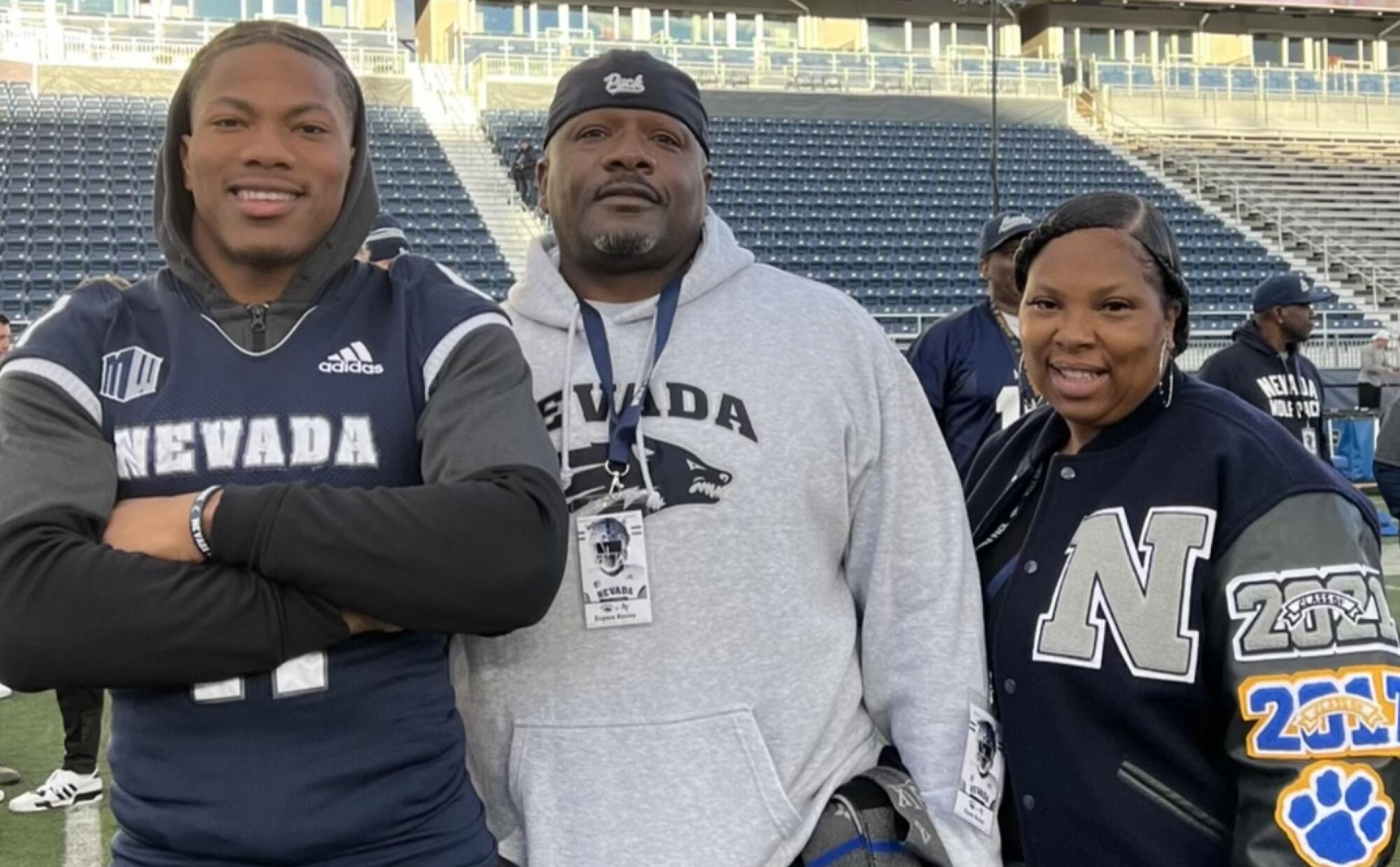
“Dad,” the little boy said, “when are you going back home?”
“Jack,” Eugene replied, “I am home. I ain’t never going to be gone away from you again.”
Daiyan had known his father only as property of the California penal system. Daiyan and his two older brothers, Michael and Jabari, would visit regularly, tagging along behind Stacey. On some trips, the boys would convince Dad to play football, wadding up a sock to serve as their pigskin. They’d run and giggle and picnic on the barely edible prison food.
The sudden proximity was a tad much to the kid looking up to that father standing over him, day after day.
“I remember my dad being a staggering figure in our home,” Daiyan said, laughing. “It’s like he came in immediately yelling and barking. He basically messed up the feng shui of the whole house.”
But that proximity was exactly the idea, the reason Eugene wanted one more son — one more chance — and tried to time the conjugal visit with Stacey at Calipatria State Prison so that Daiyan would be around 1 when his father returned home.
But then Eugene got in a fight, fracturing the face of another inmate, dislodging the guy’s eyeball. Authorities dumped Eugene in the hole, where he’d spend more than four years, his well-plotted timeline buried along with him.
Even worse, solitary meant family visits were restricted to 15 minutes, Eugene figuring that wasn’t enough time to justify Stacey and the boys driving nearly three hours to the facility in Corcoran, where he had been transferred.
And there was another thing that discouraged time together.
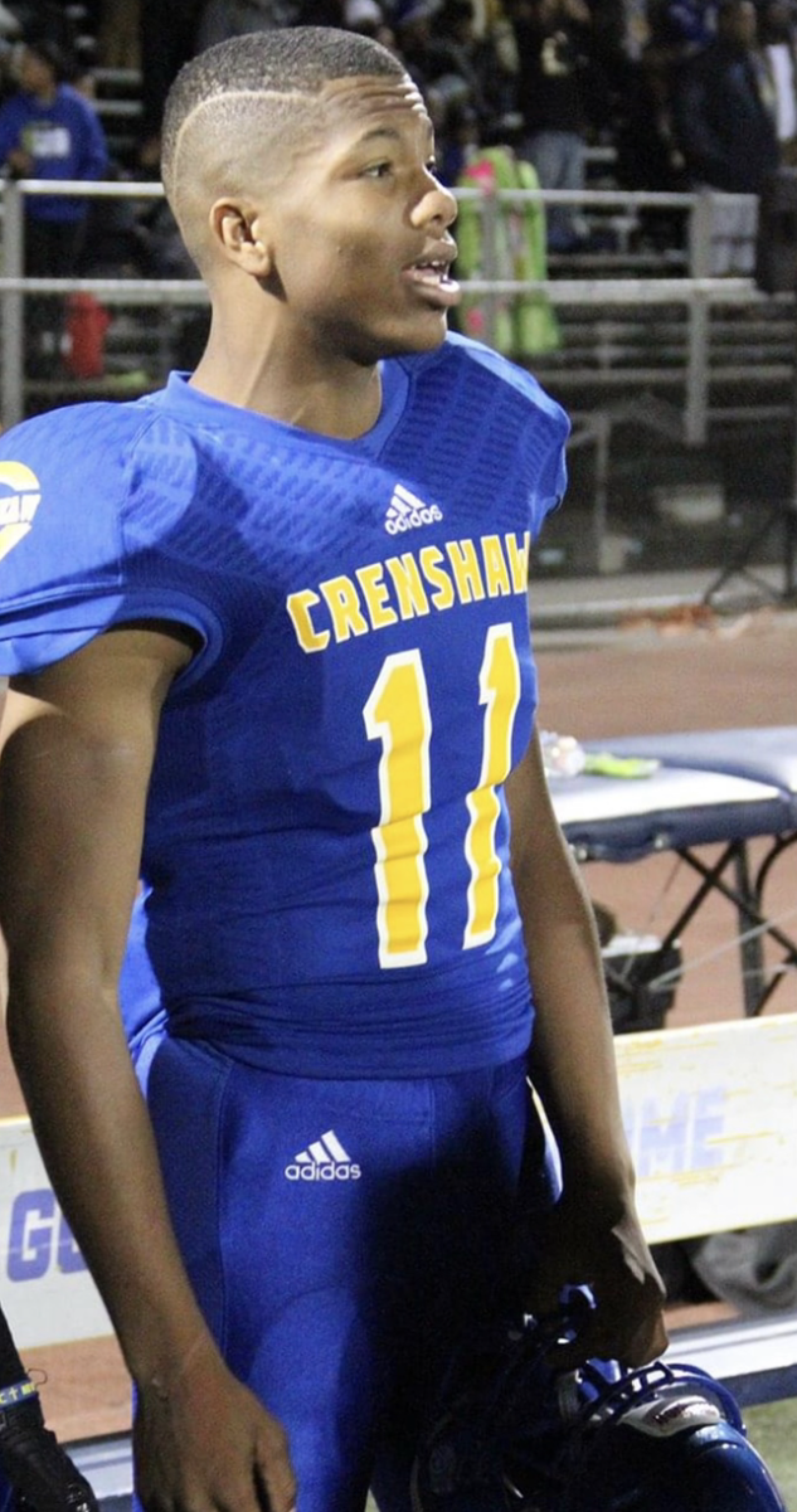
“I didn’t want them to see me in a hole, in a cage, behind glass looking the way I was looking,” Eugene, now 56, said. “In hindsight, it broke the connection. I should have let them come see me once every other month.”
The lost time, Eugene is certain, hurt Michael and Jabari, who already had lived the majority of their lives without a dad at home. The boys struggled with the same streets their father dominated.
“The other boys went through a lot growing up without a father and in an area where their dad had such a big name,” said Eugene, who didn’t meet his father until he was 16 and being released from Central Juvenile Hall. “That was my fault because I was gone. It’s the story of the absentee father.
“The two who didn’t have a dad went through the hard times. They were the ones gangbanging, making bad decisions. I don’t knock ’em. Not one bit. I take the blame for that, 100%.”
Daiyan heard the same stories of all the things his father had done, the drug dealing and fighting, the general mayhem wrought by the kingpin of the Rollin’ 60s, a faction of Crips this publication once described as “heavily armed.”
But Daiyan also was sitting in the backseat while his dad drove him to practice, was on the receiving end of his father’s tough-love coaching and was watching as Eugene began to shine brighter in and around Crenshaw.
Initially, Eugene was thought to be facing more than 50 years in prison. He joked in “Hip Hop Uncovered” that, by the time of his release, the world would be traveling by flying car.
As it was, being away for 13 years was more than enough, Stacey fast-tracking Eugene back to the outside world on their drive home from prison.
“He thought I was going too fast,” she recalled. “He felt like he was on a spaceship. I said, ‘You’re used to being on that big-ass school bus going 20 miles an hour. The speed limit is 65. We doin’ 80, OK?’ ”
Shortly after Eugene’s release, the family moved to a two-story house just a few minutes from where Eugene grew up but along streets safer and saner.
This is where Daiyan first met Kurupt, whom he described as “almost like an uncle.” This is also where Hussle lived with the family for a while, recording some of his first tracks in their downstairs studio.
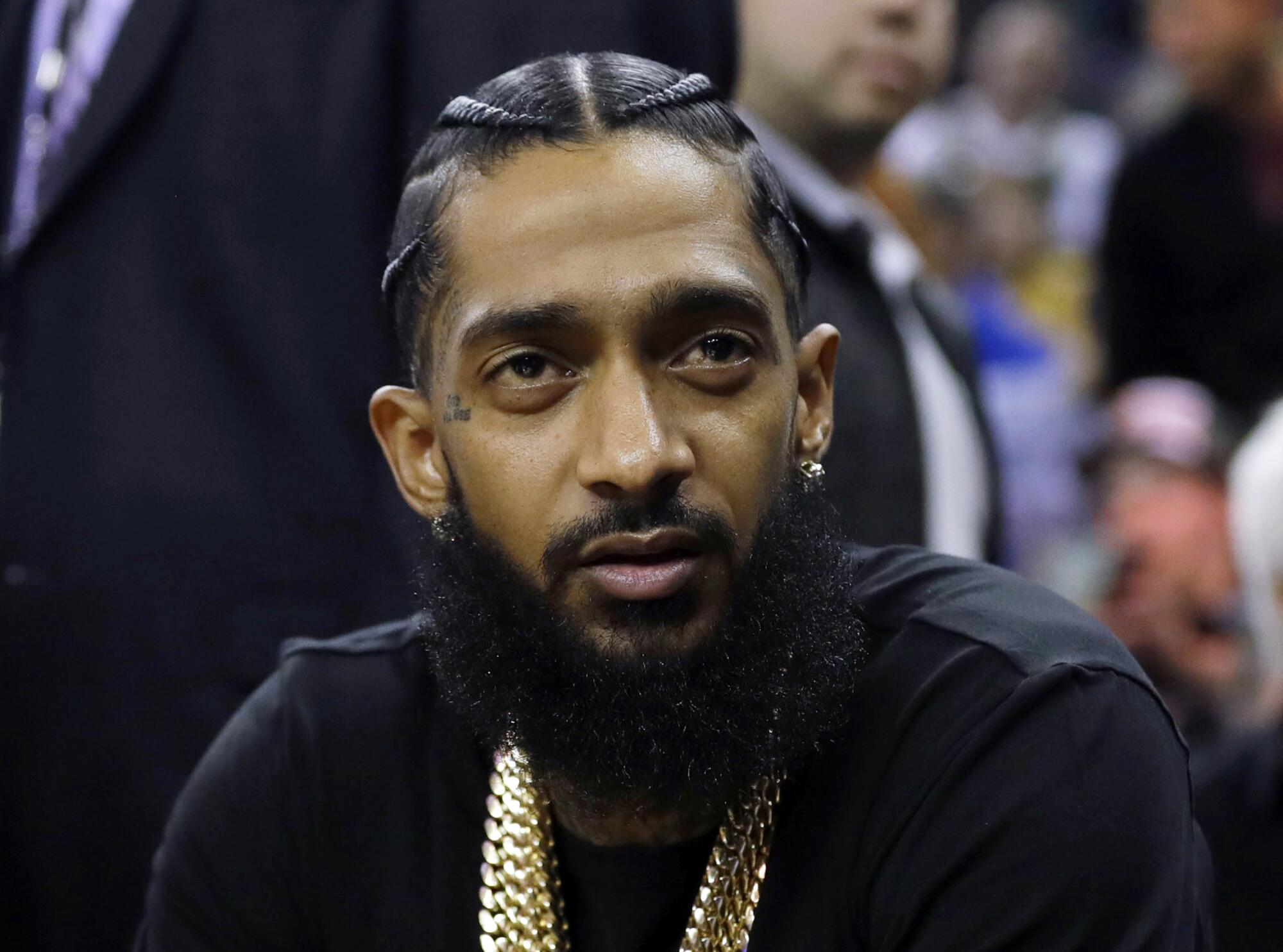
“I got to watch Nipsey grind — literally like his name ‘Hussle’ — in our basement,” Daiyan said. “He used to be down there for hours at a time. That was a good lesson for me.”
Now fully free, Eugene began along the course he had charted. One of his first projects became Developing Options, a nonprofit involved in everything from gang intervention to feeding children. Formerly called the Ex-Offender Fellowship Network, Developing Options aids in finding jobs for former inmates, counseling young people on life skills and providing educational opportunities for the less fortunate.
“God had a plan for me to be here as an example for my community,” Eugene said. “Look at me. I came from the lowest point. I’ve been in the worst place America has … a dungeon in a cage.”
Around the same time, Kurupt took Eugene to Death Row Records to meet Suge Knight, a man Daiyan said is “like my god dad.”
The two connected, with Snoop Dogg, in “Hip Hop Uncovered,” explaining: “Suge recognized what Big U meant. This [man] moves mountains, and he’s intelligent.”
The Chargers are known for fielding an elite offense, but the team’s defensive players are pushing to become equally as celebrated for their success.
Knight gave Eugene money to help restart both his personal and professional lives, his introduction to music having come earlier when rapper Poppa LQ, wanting more street cred, asked Eugene to be his manager.
Eugene’s No. 1 project, though, was Daiyan. He formally began coaching his youngest son in Snoop Dogg’s kids football league. But the teaching started before that and lasted much longer.
Daiyan still has videos of their 5 a.m. workouts, training in the backyard or running the hills of the neighborhood. Some mornings, Daiyan would sneak in a half-hour nap before showering and running off to school.
Never once, he said, was he lured by what lurked just down the road.
“If anyone was ever to come to my dad and say, ‘Hey, Big U, we saw your son doing this or that,’ he would have lost it,” Daiyan said. “The whole neighborhood would have been in trouble.”
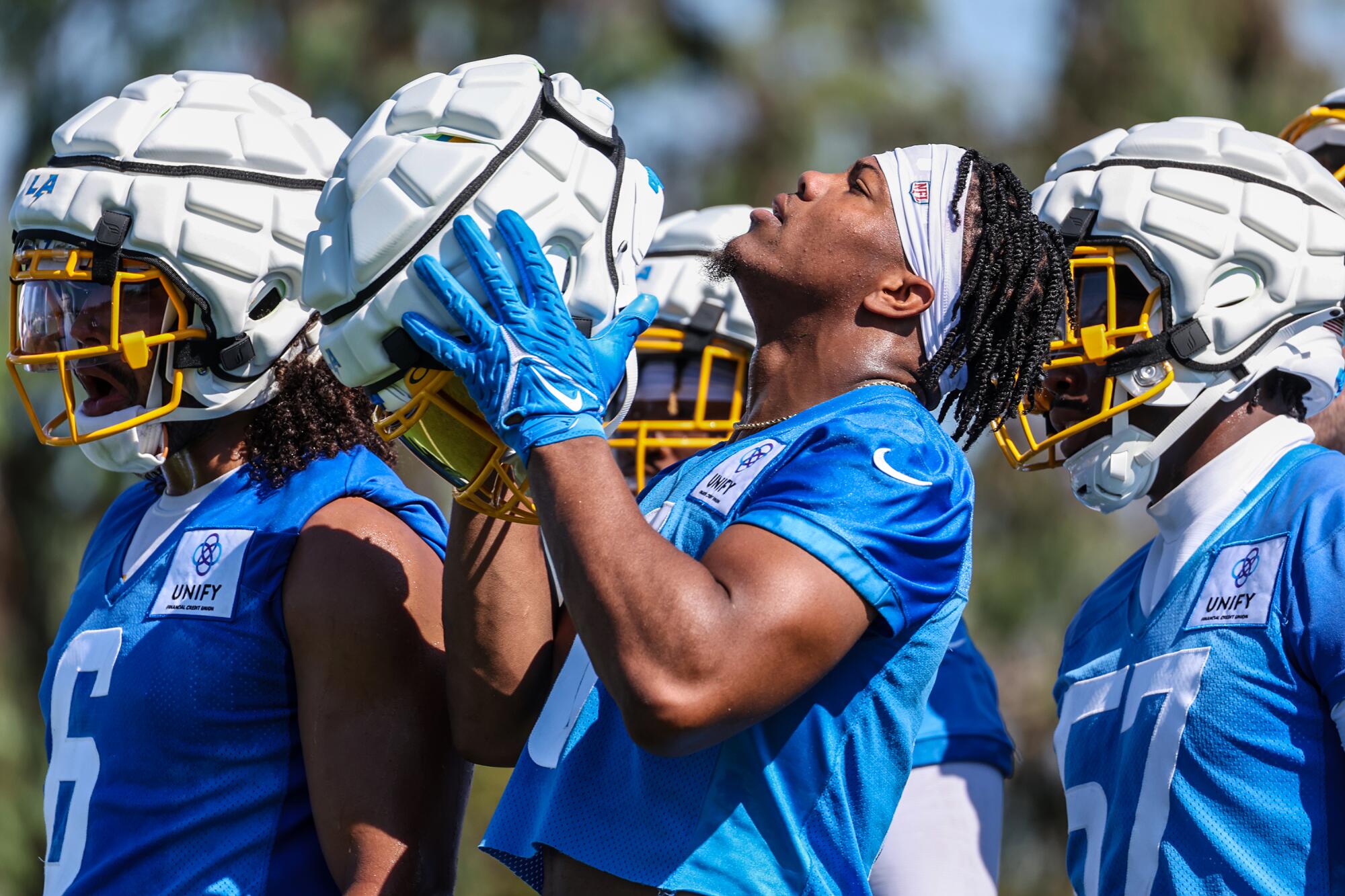
“He made it. He made the right decisions every step of the way and then slid on home. He really, like, ran around the bases and slid home, you know? For real.”
— Eugene Henley, on his son, Daiyan, playing for the Chargers
Their house became the gathering place for school buddies and peewee teammates. Eugene took to referring to the boys as his sons or nephews. Today, nothing has changed, the home still alive with neighborhood kids looking for somewhere to chill. Eugene and Stacey added to the frenzy too by having one more child, a daughter named Cherysh.
Likening their existence to “The Waltons,” Stacey said her husband is the draw, the big man’s vibes serving as a gravitational pull.
“A lot of kids want to be in this house because he’s in this house,” she said. “It doesn’t matter what they’ve done, if they’ve gotten in trouble or something. When he says, ‘We going to the house,’ they all want to be here.”
Said Daiyan: “My mom asked me the other day, ‘Why can’t I get rid of all these kids?’ I told her, ‘Because you’re living with the biggest one.’ ”
Just three miles from the Henley home waits SoFi Stadium, where Daiyan will play this fall. After starting his college career at Nevada in 2017, he spent his final season at Washington State. Eugene and Stacey flew to most of his home games over the last six years, but now can drive to them for the first time since Daiyan graduated from Crenshaw High.
After Chargers minicamp in June, Daiyan returned to Crenshaw to speak at an event for the football team. He told the players that he’s an example of just how close the NFL really is for them, standing there just an arm’s length away.
He also reminded them that he’s available — as near as a DM — if they need anything, Daiyan already giving back just like his dad.
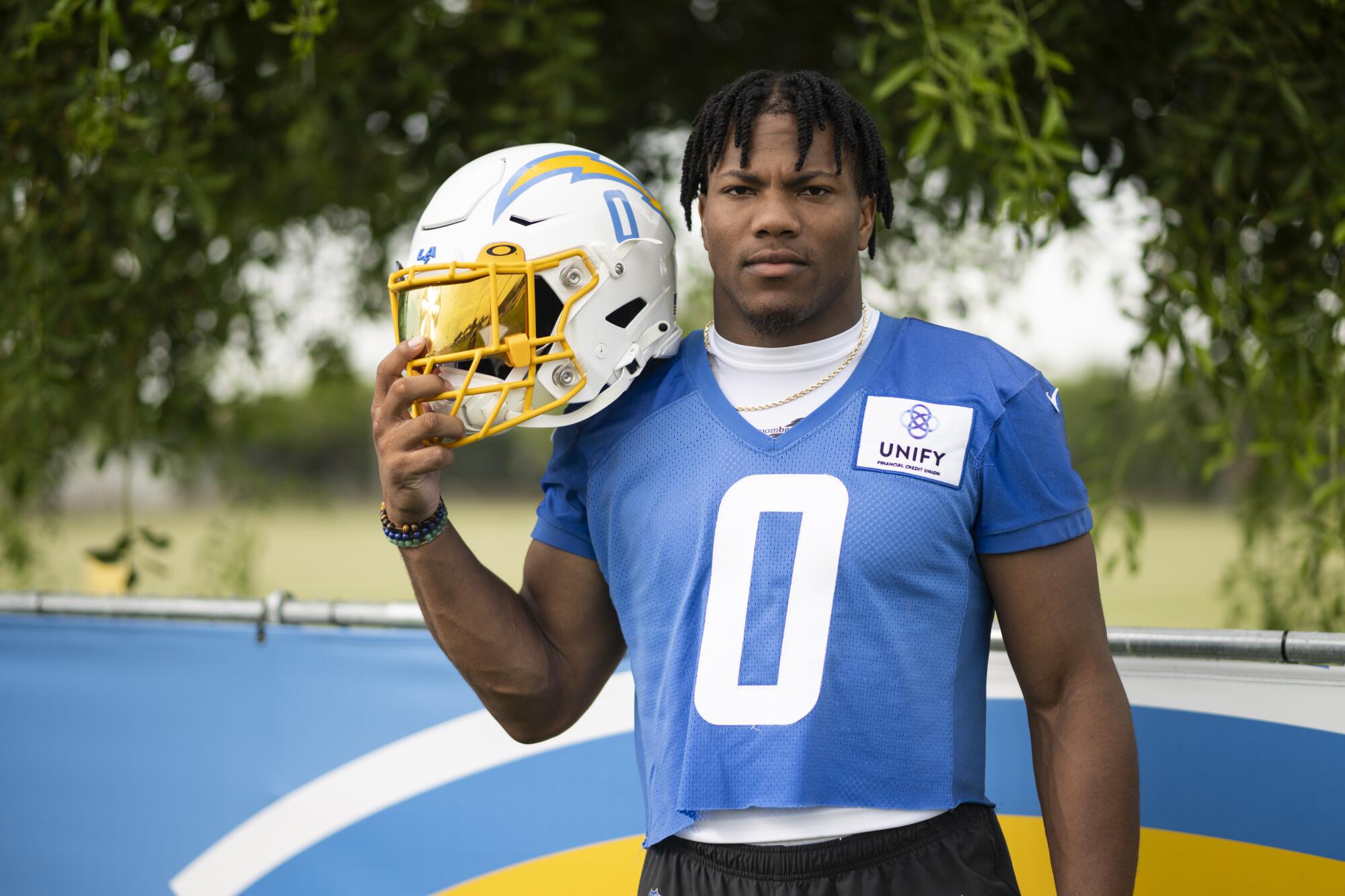
All of this feel-good was made possible when the Chargers reached just down the street to draft their latest linebacker.
Still, even with so much ground covered, Eugene’s past is never more than a glimpse away. Remember that mugshot shown so early in the “Hip Hop Uncovered” doc? It serves as the wallpaper on one of Eugene’s phones.
“Keeps me disciplined,” he said.
Eugene was asked what makes him most proud of Daiyan.
“There’s got to be a better way to ask that question,” he said. “Like, ‘What are you not most proud of?’ He made it. He made the right decisions every step of the way and then slid on home. He really, like, ran around the bases and slid home, you know? For real.”
This is an L.A. story, to be sure, another homecoming celebration for a family that knows how to embrace coming home.
More to Read
Go beyond the scoreboard
Get the latest on L.A.'s teams in the daily Sports Report newsletter.
You may occasionally receive promotional content from the Los Angeles Times.

